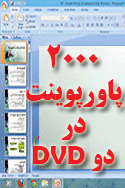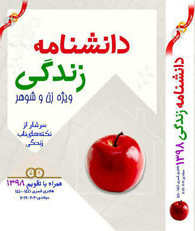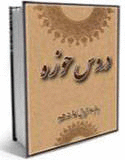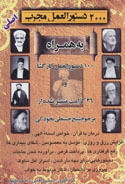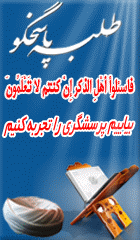کلیپ های دیدنی
مشاوره و خانواده
با توجه به ترک خود ارضایی عوارض آن هنوز در من هست چگونه آن را برطرف کنم ؟
13-08-1399 بازدید:5574 مباحث جنسی و زناشویی همکار پاسخگو

آیا بخاطر وسواس فکری توهین به مقدسات گناه دارد؟
19-05-1398 بازدید:5243 مشکلات و اختلالات روانی همکار پاسخگو
آیا از طریق اینترنت می تواند ازدواج موقت کرد ؟
پرسش: با سلام من 22 سالمه از پارسال با يه دختري در…
از زندگی سیر شدم و آرامش ندارم چکار کنم؟
پرسش : سلام..خواهش ميکنم يه راهي جلو روم بذارين من از…
من از تاریکی شب به دلیل توهمات ذهنیم میترسم چکار کنم؟
پرسش: من وقتي در خانه تنها مي شوم و هوا تاريك…
شب ها كابوس فيلم هاي مبتذل را که قبلا نگاه می کردم میبینم!
پرسش: (در خصوص توبه از ديدن فيلم هاي مبتذل) در اين…
بنده متاهلم و در اینترنت با دختری آشنا شدم که کارمون به گناه کشید!
پرسش: بنده یک مشکلی دارم که می خواستم از شما راهنمایی بخواهم…
جوانی هستم که از زندگی خسته شده و احساس پوچی می کنم!
پرسش: راستش نمی دانم از کجا شروع کنم. 20 ساله هستم…
از طریق اینترنت با پسری آشنا شدم و مدتها با هم در ارتباط بودیم!
پرسش:من دانشجوی ارشد رشته حقوق تقریبا حدود 1 سال پیش…
چرا خانواده ها عاشق شدن را برای جوانان (دختر) بد می دانند؟
پرسش: چرا خانواده ها عاشق شدن را برای جوانان (دختر) بد…
چگونه دیدن فیلم های مبتذل را ترک کنم؟
پرسش: با سلام به حضور حضرت عالي اگرخاطرتان باشد ،من قبلا هم…
با شوهرم قبل از ازدواج رابطه نانشروع داشتم!
پرسش: با سلام من زنی 25 ساله هستم.حدود 1 سال است…
اگر دختری عاشق غیر هم جنس خود...؟
پرسش: اگر دختری عاشق غیر هم جنس خود شود البته نه…
اگر نتوانيم جلو شهوت خود را بگيريم ، چه بايد بكنيم ؟
پرسش: اگر نتوانيم جلو شهوت خود را بگيريم ، چه بايد…
جوانی هستم 21 ساله اهل تهران و تمایل زیادی به سکس دارم
پرسش: من جوانی هستم21 ساله اهل تهران وتمایل زیادی به سکس…
نمي دونم چرا از ازدواج مي ترسم؟!
پرسش: سلام مشکل من اینه که نمي دونم چرا از ازدواج مي…
چرا به زن مطلقه با یک چشم و دید دیگری نگاه می کنند؟!!
پرسش: سلام حاج آقا من یک خانم مطلقه هستم و سوالم اینه…
چرا مخالف رابطه دختر و پسر هستید؟؟!!
پرسش: سلام حاجاقا چند تا سوال داشتم ممنون میشم جواب بدید. 1 چرا…
شب زفاف یا حجله چه شبی است و زن و مرد چکار باید بکنند؟
پرسش: شب زفاف و یا شب حجله که در روایات هم…
چه زمانی برای رابطه جنسی با همسر مناسب است؟
پرسش: چه زمانی برای رابطه جنسی با همسر مناسب است؟ و…
دختری که در سن جوانی و نوجوانی دچار شهوت می شود چه باید بکند؟
پرسش:دختری که درسن جوانی و نوجوانی دچار شهوت می شود…
می خواهم خوب باشم ولی دوست دخترم نمی گذارد!!
پرسش: به دلیل که من مدتی است به شهر آمده ام…
وقتی که عصبانی می شوم دیگر هیچ چیزی دست خودم نیست چکار کنم؟
پرسش: سلام آقای پاسخگو من دارای اخلاق بدی هستم وبا همه خواهر…
من دحتر قبلی نيستم و به يك دختر فاسد تبديل شده ام!
پرسش: من دختري هستم 14ساله من اول دختري سنگين بودم اما…
در مورد وسواسی و راه درمان آن توضیح بفرمایید؟
پرسش: وسواسی چیست و برای درمان آن چه راهکارهایی معرفی می…
خواسگارم بد اخلاق است آیا جواب مثبت بدهم؟
سوال: آیا به پسر بد اخلاق که خواستگاری کرده جواب مثبت…
اخلاقم رُك گفتن است اما حق ميگويم و شوهرم مخالف رفتارم است.
پرسش: اخلاقم رُك گفتن است اما حق ميگويم و شوهرم…
خواستگارم دو ازدواج و یک نامزدی ناموفق داشته جواب مثبت بدم؟
پرسش: خانمی هستم که در گذشته، یک ازدواج_ناموفق داشتم. در حال…
شوهرم گلایه میکنه که چرا همیشه به حرفم گوش میدی!
پرسش: من 20 سالمه 1 ساله ازدواج کردم شوهرم 22 سالشه…
دختر 36 ساله ای که چهره زیبایی ندارد چکار کند؟
پرسش: با سلامدختر 36 ساله اي که مومن و حافظ قرآن…
اختلاف سني پسر با دختر تا چه مقدار ايده آل است؟
پرسش: ميخواستم بدونم ايا ازدواج با دختري که سنش با پسر…
چگونه از انحرافات جنسى به دور باشيم؟
پرسش: در فاصله سنّ بلوغ تا هنگام ازدواج چگونه از انحرافات…
بعضی وقتا اعصابم میریزه بهم با نامزدم بدرفتار میکنم چطورخودمو کنترل کنم؟
پرسش: سلام ببخشید ی سوالی داششتم من دختری۱۸سالم ۷ماهه عقدکردم بعضی…
نقش خانواده در تربيت فرزندان چیست؟
پرسش: نقش خانواده در تربيت فرزندان چیست؟ پاسخ: با سلام و ادب خدمت شما…
نامزدم مي خواهد در كوچه و خيابان آرايش كرده و كمي از موهايم را از روسري بيرون بگذارم!
پرسش: من تا قبل از نامزديم بسيار با حجاب بودم. البته…
چرا برخی مردان در کنار همسرشان آرامش نمی یابند؟
پرسش: قرآن مجيد وجود زن را كانون محبّت و…
علت و شرايط تحقق صيغه چيست؟
پرسش: علت و شرايط تحقق صيغه چيست؟ پاسخ:…
چرا بین دو هوو همیشه اختلاف وجود دارد؟
پرسش: چرا بين دو همسر(زن) با وجود مشروعيّت ازدواج…
پرسش و پاسخ
آیا کسی که شراب بنوشد تا چهل روز نماز و عباداتش قابل قبول نیست ؟
13-08-1399 بازدید:2829 مسائل متفرقه نماز همکار پاسخگو

اذان در جامعه اسلامی نماد چیست ؟ و چرا فقط سه بار در روز تکرار می شود ؟
پرسش: اذان در جامعة اسلامی نماد چیست و…
حکم مشروبات الکلی از دیدگاه اسلام چیست ؟
پرسش: حکم مشروبات الکلی از دیدگاه اسلام چیست…
چرا با این همه ظلم و ستم در جهان امام زمان (عج) ظهور نمی کند ؟
پرسش: چرا با این همه ظلم و ستم…
اگر نگاه به نامحرم گناه است چرا در فیلمهای خارجی زنهای بدون حجاب را نشان میدهند؟
پرسش: چرا میگویند نگاه کردن به نامحرم گناه…

با چه شیوه هایی میتوانیم پیرو انبیاءالهی باشیم ؟
پرسش : چه راه و روشی را پیبگیریم…
چرا زرتشتیان به اعتقاداتشان پایبند هستند ولی مسلمانان نه؟
پرسش : چرا در دین زرتشت گفتار نیک،…
چرا معانی دقیق آیات قرآن مشخص نیست و نیاز به تفسیر دارد ؟
پرسش : به چه دلیل تا تفسیرهای متعدد…
آیا جهت انجام هر کار نامشروعی می توان صیغه جاری کرد ؟
پرسش : اهمیت صیغه کردن در چیست؟ با…
اگر پیامبر (ص) عرب زبان نبود آیا قرآن باز هم به زبان عربی نازل می شد؟
پرسش : اگر حضرت محمد(ص) زبان دیگری به…
آیا در بین پیامبران ،پیامبر خشن هم وجود دارد؟
پرسش : پیامبران به مهربانی معروف میباشند آیا…
با توجه به محاسن روزه آیا معایبی هم در آن هست ؟
پرسش : روزه محاسن بسیاری دارد، آیا این…
جنس خداوند از چه چیزی می باشد و خدا چیست؟
پرسش : جنس خداوند از چه چیزی میباشد…
معنی خدا چیست؟چرا خداوند از حروف دیگر استفاده نکرده است؟
پرسش : تعریف لغوی خدا چیست و چرا…
خال کوبی ابرو (تاتو )از نظر شرعی برای وضو و غسل چه حگمی دارد ؟
پرسش : خالکوبی ابرو (تاتو) از نظر شرعی…
شنیدن صدای زنان در مراسم عزاداری و مولودی چه حکمی دارد ؟
پرسش : شنیدن صدای زنان در مراسم عزاداری…
در چه صورتی امر به معروف و نهی از منکر واجب می شود؟
پرسش : در چه صورتی امر به معروف…
چرا در ایران مردی که از دین خود برگردد حکم اعدام را دارد ؟
پرسش: چرا در ایران مردی که از دین…
آیا ازدواج زن شیعه با مرد سنی اشکال دارد؟
پرسش : آیا ازدواج زن شیعه با مرد…
لمس آیات قرآنی که بر سنگ قبر نوشته شده است بدون وضو چه حکمی دارد ؟
برسش : لمس آیات قرآنی که بر سنگ…
فرق بین احتیاط واجب و احتیاط مستحب چیست؟
پرسش : فرق بین احتیاط واجب و احتیاط…

آیا با زیارت امامان و بوسیدن ضریح آنان انسان دچار شرک می شود؟
پرسش : آیا اعتقاد به این که شیعیان…

چرا در نماز از مهر استفاده میکنیم و فقط پیشانی بر خاک قرار می دهیم؟
پرسش : با توجه به این که هنگام…
آیا علائم هنگام ظهور امام زمان (عج) واقعیت دارد؟
پرسش : آیا وجود نشانههایی هنگام ظهور حضرت…
با وجود مساوات بین زن و مرد چرا مردان در اولویت قرار دارند؟
پرسش : با توجه به این که ما…
طریقه خواندن نماز در زمان رسول خدا (ص) چگونه بوده است؟
پرسش : طریقه نماز خواندن از زمان رسول…
چگونه می توانیم از گناه غیبت پرهیز کنیم؟
پرسش : چگونه میتوانیم از گناه غیبت پرهیز…
چگونه از بدخلقی و صفات زشتم دوری کنم؟
پرسش : چه راهی وجود دارد که انسان…
قطع رابطه با اعضای خانواده که از نظر شخصیتی و اجتماعی مشکل دارند گناه است؟
پرسش : آیا قطع رابطه با افراد خانواده…
آیا روح انسان بعد از مرگ در جسم دیگری دمیده می شود و دوباره به زندگی میکند؟
پرسش : آیا این نظریه درست است که…
اینکه در نماز کاهلی میکنم آیا در دینم خللی ایجاد می شود؟
پرسش : خدا را خیلی دوست دارم،همیشه در…
دلیل علاقه خاص به بعضی از امامان چیست؟
پرسش : چرا برخی برای بعضی امامان ارادات…
در شب اول قبر چه سوالاتی از ما پرسیده می شود ؟
پرسش : شب اوّل قبر چه سئوالاتی از…
آیا دوست داشتن یک نا محرم و ارتباط با او گناه است؟
پرسش : اگر کسی را واقعاً از صمیم قلب…
آیا ادعای ملاقات امام زمان (عج) از جانب برخی افراد صحت دارد ؟
پرسش : بر اساس روایتهای فراوانی امام زمان(عج)…
چرا به اصول و قواعد دین اسلام توجه نمی شود و پذیرش آن از سوی پیروان ادیان دیگر سخت است…
پرسش : دین اسلام کاملترین دینهاست و آسانترین…
آیا نظریه تناسخ از دیدگاه اسلام پذیرفته شده است ؟
پرسش : آیا نظریه تناسخ که بزرگان زیادی…
دست نوشته های طلبه پاسخگو

برای احترام به این ماه هم که شده این کار را انجام بده. مطمئن باش که یاد خدا باعث می شود که هیچوقت به سمت آن اشتباهات نروی.
برای همین یک ماه هم که شده از آن ها صرف نظر کرد و در ضیافت خدا شرکت بنما. بعد از این یک ماه، کیفیت زندگی ات را با گذشته مقایسه کن.
اگر بدتر شده بودی، دوباره به سمت آن گناهان و اشتباهات برو. ولی این ماه چنان عشقی به تو می دهد که دیگر زندگی ات به مانند گذشته نخواهد شد. این ماه خداوند تو را با عشق پذیرایی می کند.
The Rights Islam Offers to Women
The Rights Islam Offers to Women
With the onset of Islam and its special teachings, the life of women entered into a new phase - a phase which differed vastly from the previous one and became one in which women availed of all kinds of individual, social and human rights. The basis of Islamic teachings with respect to women is exactly what we read in the Noble Qur`an:
وَ لَهُنَّ مِثْلُ الَّذِي عَلَيْهِنَّ بِالْمَعْرُوفِ
“…The wives have rights similar to the obligations upon them, in accordance with honorable norms…” (1)
i.e. the women possess rights and privileges in the same measure as the responsibilities which they shoulder within the society. Islam considers a woman, just like a man, to possess a human soul, will and choice, and perceives her to be on the path of spiritual perfection, which is actually the purpose of human creation. It is for this reason that it has placed man and woman alongside each other, addressed them together:
ياَ أَيُّهَا النَّاسُ
O mankind,
and:
ياَ أَيُّهَا الَّذِينَ آمَنُوا
O you who have faith,
and imposed moral, educative and scientific curriculum upon both of them.
By means of verses such as:
وَ مَنْ عَمِلَ صَالِحاً مِنْ ذَكَرٍ أَوْ أُنْـثى وَ هُوَ مُؤْمِنٌ فَأُولٌئِكَ يَدْخُلُونَ الْجَنَّةَ
“…and whoever does good, whether male or female, and he is a believer, these shall enter the Paradise.”(2)
Islam has promised the benefits of complete prosperity to both the sexes. By verses such as:
مَنْ عَمِلَ صالِحاً مِنْ ذَكَرٍ أَوْ أُنْـثى وَ هُوَ مُؤْمِنٌ فَلَنُحْيِيَنَّهُ حَيَاةً طَيِّبَةً وَ لَنَجْزِيَنَّهُمْ أَجْرَهُمْ بِأَحْسَنِ مَا كَانُوا يَعْمَلُونَ
“Whoever does good whether male or female and he is a believer, We will most certainly make him live a happy life, and We will most certainly give them their reward for the best of what they did.”(3)
it has elucidated that every man and woman, by adhering to and implementing the Islamic curriculum, can achieve material and spiritual perfection, and possess a pure, good life that is replete with ease and comfort. Islam considers a woman, like man, to be completely free and independent, and the Noble Qur`an, by way of verses like:
كُلُّ نَفْسٍ بِمَا كَسَبَتْ رَهِينَةٌ
“Every soul is held in pledge for what it earns.”(4)
Or:
مَنْ عَمِلَ صَالِحاً فَلِنَفْسِهِ وَ مَنْ أَسَاءَ فَعَلَيْهَا
“Whoever does good, it is for his own soul, and whoever does evil, it is against himself.”(5)
It declares this freedom to be for all people - men and women. We observe that the Islamic penal code sentences both genders with the same kind of retribution, as can be seen in the following verse and other similar verses:
الزَّانِيَةُ وَ الزَّانِي فَاجْلِدُوا كُلَّ واحِدٍ مِنْهُمَا مِائَةَ جَلْدَةٍ
“The woman and the man guilty of adultery or fornication - flog each of them with a hundred whippings.” (6)
On the other hand, since independence is an inevitable consequence of (free) will and choice, Islam has also extended this independence to all monetary privileges, permitting women to enter into various kinds of monetary transactions and regarding her as the rightful owner of her income and investment. In Suratul Nisa we read:
لِلرِّجَالِ نَصِيبٌ مِمَّا اكْتَسَبُوا وَ لِلنِّسَاءِ نَصِيبٌ مِمَّا اكْتَسَبْنَ
“Men shall have the benefit of what they earn and women shall have the benefit of what they earn.” (7)
In view of the fact that the word اکتساب (used in the verse) - unlike the word کسب - is used to denote acquisition of wealth, the use of this word conveys the meaning that the wealth which is acquired becomes associated with the person acquiring it(8), and also taking into consideration the general rule:
أَلنَّاسُ مُسَلِّطُونَ عَلى أَمْوَالِهِمْ.
“All the people have authority over their own wealth”, (9)
Numerous verses of the Noble Qur`an were revealed at a time when a great number of the communities of the world had been reluctant to recognize the female species as a human being, regarding her as an accursed entity and a source of sin, deviation and death! Many of the ancient communities even held the belief that a woman's worship was not acceptable in the eyes of Allah. Many of the Greeks considered a woman to be a defiled entity and an evil handiwork of Satan. The Romans and some of the Greeks believed that basically females did not possess a human soul and as such, the human soul was specifically confined to the males!
Interestingly, till recently, Christian scholars in Spain engaged themselves in discussing whether women, like men, possessed human souls or not, and whether or not their souls would continue to live eternally after their deaths. After their discussions they eventually concluded that since a woman's soul is an isthmus between an animal and a human soul, it cannot be eternal, save for the soul of Maryam J.(11)
Here it becomes apparent how far from reality the allegation is, which some ignorant individuals level against Islam that it is a religion of males and not females. Generally speaking, if, due to physical and sentimental differences which exist within males and females, some differences in respect of social responsibilities are observed in the Islamic Laws, it does not by any means, diminish the spiritual worth of a woman. There exists no difference between a man and a woman in this regard; the doors of success and prosperity lay equally open for both of them, just as we read in the Quran:
بَعْضُکُمْ مِنْ بَعْضٍ
“All are from one species and one society.”(12)
NOTES:
1. (The Quran 2:228)
2. (The Quran 40:40)
3. (The Quran 16:97)
4. (The Quran 74:38)
5. (The Quran 45:15)
6. (The Quran 24:2)
7. (The Quran 4:32)
8. Refer Al-Mufradat of Raghib Isfahani. It should be known that this point is applicable in instances when كَسب and اِكتِساَب are used in conjunction with one another.
9. An Authentic Juristic Rule in Islamic Jurisprudence extracted from several Quranic verses and Traditions.
10. Tafsir-e-Namunah, vol. 2, pg. 113
11. Refer the books An apology for Muhammad and the Quran, Huqooq-e-Zan Dar Islam and other books related to the humans beliefs and views.
12. Tafsir-e-Namunah, vol. 3, pg. 223
وبگــــــــــردی طلبۀ پاسخگو
- فایل اعمال و رفتار های خلاف قانون جناب آقای حسن روحانی
- در کنج خانه طلبهها چه میگذرد؟
- سکوت چند ساله مسئولان حوزه در قبال حملات وحشیانه به طلاب!
- می گویند که مملکت مملکت آخوندهاست!!
- یک ماجرای تلخ که خانم ها با تأمل بیشتر بخونند
- جریان های تکفیری موجود در عراق و نحوه شکل گیری آنها
- سیر تکاملی تفکر سلفیه چگونه بوده است؟
- بداء در قرآن و حدیث چگونه مطرح شده است؟
- پیامبر (ص) با مخالفین خود چگونه بر خورد می کرد؟
- سبک زندگی حضرت زهرا سلام الله علیها
- ملاک کرامت و شرافت افراد، انسانیت است یا جنسیت؟
- رنگ و پوشش های رنگی در اسلام
- حجاب، زنان را افسرده میکند و مانع پیشرفت اجتماعی آنهاست!!!
- علوم لدنی معصومین
- مگر ولی فقیه معصوم است که ولایت مطلقه دارد؟
- اگر خدا ازعاقبت ما اطلاع دارد قیامت برای چیست؟
- آیا بجای نماز خوندن، پیانو یا سه تار بزنم؟
- چرا مراسم عزاداري امام حسين(ع) پيش از شهادت ايشان صورت ميگيرد؟
- چرا امام حسين(ع) در كربلا براي رفع تشنگي از خداوند طلب باران نكرد؟
دانــــــلود های مفیـــــــــــــــــــد
- دانلود پاورپوینت شناخت وهابیت و صهیونیسم و ارتباط با همدیگر
- دانلود دو پاورپوینت اجرای عید غدیر خم
- دانلود پاورپوینت احتجاج اميرمؤمنان (ع) به غدير
- پژوهشی در کلام و پیام مقام معظم رهبری پیرامون ماه رمضان
- خطبه شعبانیه و خطبه امیرالمومنین(علیه السلام) پیرامون روزه و ماه رمضان
- دانلود پاورپوینت و pdf تفاوت های زن و مرد
- دانلود جزوه ساعات سعد و نحس(زمان نوشتن دعا)
- تقویم مذهبی شمیم یار 96 مخصوص کامپیوتر
- دانلود نرم افزار «شیعه شناسی»
- دانلود پاورپوینت ساختار خانواده و مسایل آن
- دانلود کتاب دایره المعارف جنسی
- دانلود نکات جذاب دوران عقد
- دانلود کتاب درمان سرد مزاجی و بی میلی جنسی بانوان
- دانلود کتاب حسادت کودکان
- دانلود کتاب درمان خستگی وناتوانی جنسی
- دانلود پاور پوینت اسیب های ازدواج وخانواده
- دانلود پاورپوینت هشت گام برای تحقق رویا به واقعیت
- دانلود پاورپوینت تقویت اراده
- دانلود پاورپوینت موفقیت وروشهای رسیدن به ان
- دانلود پاورپوینت هنر رفتار با افراد دشوار
- دانلود پاورپوینت جملات جالب وجذاب روحیه بخش بزرگان
- دانلود پاورپوینت راههای مقابله ودرمان استرس
- دانلود پاورپوینت نیازهای اساسی کودکان
منبــــرهای مکــــــــــــــــــتوب
- منبر مکتوب: روز عرفه و فرصت ها
- منبر مکتوب: سبک زندگی امام باقر علیه السلام
- منبر مکتوب: سه نیاز مومن (امام جواد علیه السلام)
- سخنرانی سلسله ای و چند جلسه ای مناسبت ماه رمضان
- دانلود 30 جلسه سخنرانی ماه مبارک با موضوع تنها مسیر
- موضوعات پیشنهادی سخنرانی برای محرم
- فضائل حضرت قمر بنی هاشم علیه السلام
- برکات وجود ابا عبدالله علیه السلام بر عالم
- بررسی بُعد اخلاقی،عبادی و عرفانی عاشورا
- آخرين وصيت امام حسين عليه السلام
- اولین علت رویاروی در کربلا؛ دوری از یاد خدا
- هميشه حزن؟ شادي چرا نه؟ - شب دهم محرم
- چرا نفرين ؟ - شب نهم محرم
- نماز ظهر عاشورا - شب هشتم محرم
- فلسفه عزاداری - شب هفتم محرم
- دفاع از دین - شب ششم محرم
- فلسفه حضور خانواده سيد الشهداء - شب پنجم محرم
- علم امام علیه السلام به شهادت - شب چهارم محرم
- فقدان شرایط امر به معروف و نهی از منکر- شب سوم محرم
مناظرات طلبه پاسخگو
بیشترین دانلود ها
- دانلود صوتي تکنیک های نزدیکی زن و شوهر (108062)
- دانلود رایگان کتاب خواص سوره های قرآن (54775)
- دانلود پاورپوینت بسیار مفید مهارت های زندگی (37432)
- دانلود پاورپوینت و pdf تفاوت های زن و مرد (33803)
- دانلود كتاب مسائل جنسي و زناشوئي در احاديث (33767)
- دانلود کتاب دایره المعارف جنسی (31827)
- دانلود پاورپوینت های آموزش پیش از ازدواج (30508)
- دانلود بسیار مفید پاورپوینت آئین همسرداری (29882)
- دانلود پاورپوینت آموزشی بررسی رابطه دختر و پسر (29534)
- دانلود 110جلد کتاب بحارالانوار علامه مجلسی ره (29482)
- دانلود كتاب دختران خوب به آسمان می روند دختران بد به همه جا (28471)
- دانلود کتاب آموزش جنسی آقایان (28254)
- دانلود كتاب فرق و مذاهب كلامي استاد رباني گلپايگاني (28212)
- دانلود کتاب درمان سرد مزاجی و بی میلی جنسی بانوان (28013)
- دانلود نکات جذاب دوران عقد (27565)
- دانلود نرم افزار «شیعه شناسی» (25862)
- دانلود کتاب درمان خستگی وناتوانی جنسی (25123)
- دانلود پاورپوینت تقویت اراده (23608)
جدیدترین مطالب سایت
- پاسخ به شبهات ولایت (4660) بازدید
- پاسخ به شبهات ولایت (4456) بازدید
- اذان در جامعه اسلامی نماد چیست ؟ و چرا فقط سه بار در روز تکرار می شود ؟ (3883) بازدید
- باتوجه به عادل بودن خداوند چرا بعضی از انسانها را ناقص الخلقه آفریده است ؟ (3961) بازدید
- ویژگی خاص قرآن چیست که کسی نمی تواند مانند آن را بیاورد ؟ (4181) بازدید
- با توجه به ترک خود ارضایی عوارض آن هنوز در من هست چگونه آن را برطرف کنم ؟ (5574) بازدید
- آیا بدن اخروی مانند بدن مادی است ؟چهره ی واقعی انسان در قیامت چگونه است ؟ (4976) بازدید
- آیا ادعای ملاقات امام زمان (عج) از جانب برخی افراد صحت دارد ؟ (4474) بازدید
- چرا به اصول و قواعد دین اسلام توجه نمی شود و پذیرش آن از سوی پیروان ادیان دیگر سخت است ؟ (4845) بازدید
- فلسفه وجود لباس روحانیت در عصر حاضر چیست ؟ (3525) بازدید
- آیا وظیفه یک روحانی تنها راهنمایی مردم و فعالیت و تدریس در حوزه هاست ؟ (2933) بازدید
- آیا نظریه تناسخ از دیدگاه اسلام پذیرفته شده است ؟ (5197) بازدید
- آیا توصیف بهشت و جهنم در قرآن تمثیل هایی برای درک بهتر آن جهان است ؟ (4812) بازدید
- با توجه به اینکه اسلام کاملترین دین هست چرا ما نسبت به کشور های غیر مسلمان عقب مانده تر هستیم ؟ (6698) بازدید
- نقش امام و رهبر در جامعه اسلامی چیست ؟ و اگر نباشد چه اتفاقی می افتد ؟ (4522) بازدید
پربازدیدترین های سایت
- زنی هستم که میخواهم به شوهرم خیانت کنم!!! (605276)
- آيا زن شوهر دار بخاطر رفع نیاز جنسی اش ميتواند صیغه شود؟ (500981)
- دوست دخترم حامله شده چکار کنم؟ (398571)
- میل جنسی زیادی دارم و به شدت داره منو عذاب می ده (340490)
- دیدن فیلم های مبتذل زن و شوهر برای تحریک شدن جنسی (217806)
- چگونه همسرمان را آماده آميزش جنسي كنم؟+18 (213112)
- حکم شرعی نزدیکی از پشت! (208028)
- خانم هایی که می خواهند طلبه شوند بخوانند!!! (205462)
- زنم رابطه جنسی برقرار نمیکند!!! (199656)
- از تجربه های تلخ و تکان دهنده دختران بخوانید شاید... (172386)
- گناه با محارم خود داشتم! (146304)
- رابطه جنسی دهانی حكم چيست؟ (130710)
- محرمات و مکروهات و مستحبات حائض+حکم ورد به امکان مقدسه (129486)
- به رابطه خانمم با خواهر زاده اش مشکوکم؟ (123111)
- سفارش اسلام در مورد آمیزش صحیح چیست؟ (99040)
- نام كتاب حضرت نوح و حضرت ابراهیم؟ (97036)
- با زنان چشم سبز ازدواج نکنیم؟ (94746)
















































